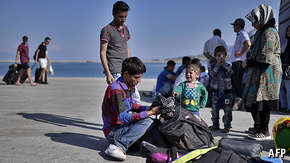The Greeks are not taking ownership of bail-out reforms
Since Greece and its European creditors reached a deal to keep the country from defaulting out of the euro zone in early July, two questions have loomed over Athens. The first is whether the Greeks will, or can, implement their end of an agreement that redoubles the very austerity measures the far-left Syriza government campaigned against. The second is whether trying to do so will fracture Syriza and bring down the government. Alexis Tsipras, the prime minister, prevailed over the rebellious hard-left faction in his party at a tense meeting of the Syriza’s central committee on July 30th, but the threat of a rupture remains.
The 200-member committee approved the prime minister's proposal to hold an extraordinary party congress in September. By that time, he hopes, the details of Greece's new €86 billion ($94 billion) bail-out—the country’s third—will have been agreed. But his earlier suggestion that Syriza should hold a referendum of party members immediately on whether to continue the bail-out negotiations was dropped. The key opponent was Panayotis Lafazanis (pictured at right), a former official in Greece’s Communist Party who was dumped as energy minister in a cabinet reshuffle earlier this month, and who leads Syriza’s mutinous Left Platform faction.
Holding an extraordinary congress would clear the way for Mr Tsipras to call an early election by the end of the year to consolidate his power. But it risks triggering a split with Left Platform. "The premier bought some time tonight, but that was all ," said one participant in Thursday's meeting. At one point Mr Lafazanis mocked the prime minister by comparing his referendum proposal to the national referendum held July 5th, in which most Greeks rejected a bail-out plan that had been offered by the European Commission—only to see Mr Tsipras accept a new rescue package on harsher terms a week later. "How many referenda are we going to have?” asked Mr Lafazanis. “We've already staged one and we won with 62% of the vote."
Mr Lafazanis and his supporters—believed to include about 40% of the central committee and some 30 out of Syriza's 149 MPs—insist that a Grexit from the euro is feasible, despite the threat that a deep devaluation and high inflation could push Greece further into recession. The new currency, Mr Lafazanis argued at the meeting, could be backed by the roughly €35 billion that Greeks hold in cash, an amount that has swelled as many citizens have withdrawn their savings from the country’s precarious banks.
Left Platform is expected to keep up the pressure on Mr Tsipras. Its lawmakers defected in two parliamentary votes on "prior actions", reforms demanded by Greece’s creditors as a condition for a €7.2 billion bridge loan to pay creditors this month. That left the government dependent on the votes of pro-European opposition parties. More votes loom in the next two weeks. The government still hopes that bail-out negotiations can be completed by August 12th, and an aid tranche disbursed in time to make a €3.2 billion repayment to the European Central Bank on August 20th. But that timetable looks overly optimistic, given that the so-called "quadriga" of bailout monitors from the European Commission, the International Monetary Fund, the European Central Bank and the European Stability Mechanism (the EU's own bailout fund) arrived in Athens only this week.
Even before the negotiations got properly underway, signs of new dissension between Greece and its creditors were beginning to emerge. The Syriza-led government insists it will only implement reforms specifically included in the bail-out Mr Tsipras agreed to at the EU summit, while the quadriga has lined up a series of additional measures. Some of the quadriga's demands are unpopular but necessary. Further cuts are urgently needed to keep the loss-making state pension system from collapsing by 2025. And it would be logical for Greek farmers to pay the same 26% profit tax as other businesses rather than the 13% they pay now, especially since the lower rate has led thousands of Greeks to define themselves dubiously as “farmers”.
A second bridge loan is already being considered by EU officials. It would require parliament to approve yet more prior actions. The most controversial, which Mr Tsipras has already accepted, would be to roll back measures passed earlier this year by Syriza that reversed structural reforms implemented during Greece's two previous bail-outs. The government has been rehiring some of the public-sector workers it fired under those reforms, including the 1,300-strong Athens municipal police force abolished two years ago as part of a sweeping overhaul of the civil service. Fines imposed on taxpayers in arrears were slashed; taxpayers were allowed to pay debts owed to the state over many as 100 instalments.
Conclusion
Those measures eased the pressure on cash-strapped Greeks and cut across party political boundaries. Even the pro-European opposition might balk at repealing them. Numerous European officials and analysts have warned that for any new bail-out to work, Greece must “take ownership” of its reform programme. So far Athens seems to be acting less like the owner of the reforms than a reluctant tenant.
Dr. Chao
4-August-2015


